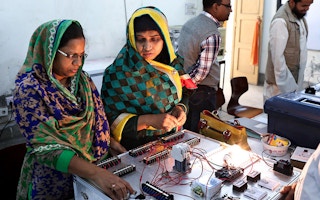The world has seen tremendous economic growth over the last decades, which has led to poverty reduction and increased welfare for millions of people. Environmental sustainability and social inclusiveness are key to the resilience of these gains and continued growth. “Leaving no one behind” as we navigate a shift towards green economies must be woven throughout the growth and development agendas.
To continue reading, subscribe to Eco‑Business.
There's something for everyone. We offer a range of subscription plans.
- Access our stories and receive our Insights Weekly newsletter with the free EB Member plan.
- Unlock unlimited access to our content and archive with EB Circle.
- Publish your content with EB Premium.
Most obvious is the acknowledgement that unless we can include women – 50 per cent of the world’s population – in economic growth and climate action, we will not reach our full potential. This was recognized at COP23 with the establishment of the Gender Action Plan highlighting that women and men are impacted differently by climate action, and that unequal participation of women is impeding efforts to solve our shared challenges.
Green growth provides a powerful vehicle for modernizing economies while simultaneously reducing inequalities and safeguarding natural resources and ecosystems. Global Green Growth Institute (GGGI) is working with governments in 28 countries to identify transformational green growth potential through policy, financial vehicles and investment projects in support of Nationally Determined Contributions (NDC) and Sustainable Development Goals (SDG).
Fortunately, our experience shows there are not necessarily trade-offs between social, environmental and economic outcomes. Increasing equitable access to sustainable services leads to the growth of markets and strengthened economies that bring resilience and prosperity to people.
Addressing barriers to gender equality requires bold leadership, innovations, and broad, cross-sectoral engagements. Transformational change happens through deliberate strategy, resources and actions.
For example, the Government of Rwanda has shown commitment to gender mainstreaming across ministries, and GGGI has supported the adoption of a Gender and Social Inclusion Framework into the National Roadmap for Secondary Green City Development.
In Indonesia, GGGI has worked with the provincial governments of East and Central Kalimantan to promote gender equality, poverty reduction and safeguards through synergies between Provincial Energy Plans and across Provincial Sustainable Development Plans. The aim is to identify opportunities across sectors to allow gender equality to ride on the green growth agenda.
In Vanuatu, GGGI has supported the government taking policy a step further by making finance work for women, marginalized groups, and the poor by incorporating gender and social inclusion into the design of a National Green Energy Fund (NGEF).
By aligning the fund’s financing criteria with the Sustainable Development Plan and National Gender Policy, the aim is to enable women and men to access credit to invest in green technologies through innovative and inclusive finance.
“
Green growth provides a powerful vehicle for modernizing economies while simultaneously reducing inequalities and safeguarding natural resources and ecosystems.
Under the Amazon Vision Program in Colombia, GGGI has supported indigenous groups to have direct access to financing. GGGI supported the Organization of Indigenous People of the Colombian Amazon Region (OPIAC) in developing a successful proposal for strengthened environmental governance.
In its implementation, women and men will be involved as green jobs are created. Securing livelihoods opportunities is essential to fight against deforestation and remove environmental stressors in remote areas of the Amazon.
Similarly, in Indonesia, GGGI’s work with the Peatland Restoration Agency to mainstream gender responsive policies into the mobilizing of public private partnerships and carbon finance to restore and stop further degradation of peatlands across the country will ensure creation of co-benefits to local communities.
Without the active participation of women in decision-making and implementation, a project is less likely to achieve its economic and environmental objectives.
We have come far, and we have a long way to go. Women are still under-represented in politics around the world. Globally, the pay gap between men and women for equal work remains a concern. The World Bank released a report in 2016 concluding that out of 173 economies surveyed, 155 have laws impeding women’s economic opportunities, be it gender-based job restrictions, legal rights to land tenure, and other policies which hampers women’s opportunities to be active agents of change in the families, communities and country.
GGGI’s Member countries have made ambitious NDC and SDGs commitments. There is a broad recognition that green growth will only be effective and sustainable when proven beneficial to people. For International Women’s Day, GGGI reconfirms its commitment to transforming towards economic growth that is environmentally sustainable and socially inclusive, with particular focus on gender equality”.
Frank Rijsberman is the director-general of the Global Green Growth Institute. This article was written exclusively for Eco-Business.











